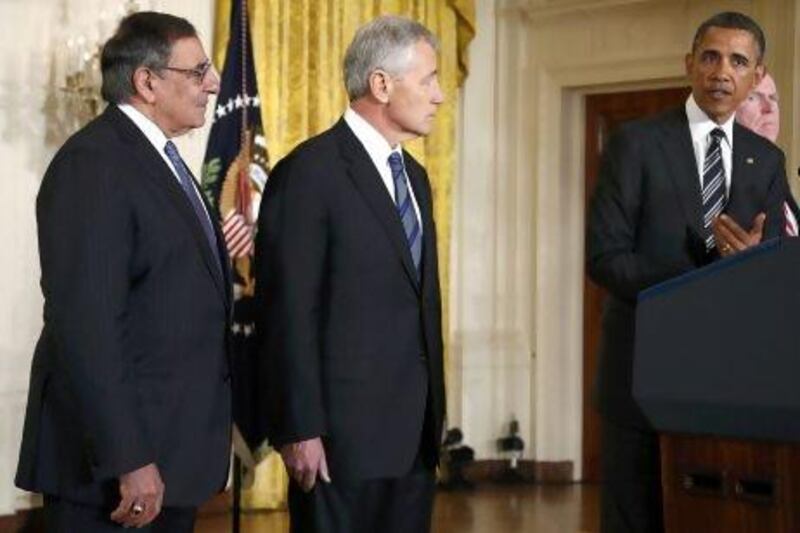TEL AVIV // Benjamin Netanyahu, Israel's prime minister, is more likely to include centrist parties in his ruling coalition - if, as expected, he regains the premiership in this month's elections - after Chuck Hagel was nominated as the next US secretary of defence, analysts said yesterday.
Mr Hagel was named for the top Pentagon position on Monday.
His stance on Iran's nuclear ambitions and the Israeli-Palestinian peace process - the key foreign policy issues facing Israel - are viewed as being more moderate than those of Mr Netanyahu.
The United States is Israel's staunchest financial and diplomatic backer but the Israeli prime minister is said to already have a tense relationship with Barack Obama, the US president.
He may try to reduce the tensions by choosing centrist rather than right-wing political partners.
Mr Netanyahu's Likud party is predicted by all polls to win the January 22 elections.
"For Israel and for Mr Netanyahu, Hagel's nomination is a disaster," said Eytan Gilboa, a specialist on US-Israeli ties at the right-leaning Bar-Ilan University in Tel Aviv.
"He is perceived as opposing Israel's position on Iran and on talks with the Palestinians."
Mr Gilboa said the nomination of Mr Hagel - coupled with the naming of the former senator, John Kerry, known for his cautious approach to using military force, as secretary of state - "strengthens the case for Netanyahu to go with centrists" in his next government.
The Israeli premier may also pick moderate and centrist figures to head the foreign and defence ministries in a bid to improve ties with Washington and avoid disagreements on Iran and the Palestinians, said Mr Gilboa.
Mr Netanyahu heads what many commentators have called the most right-wing coalition in Israel's history, which mainly consists of ultranationalist and ultrareligious parties.
His government has drawn wide condemnation from both the US and European allies for impeding Palestinian statehood goals by advancing the construction of Jewish settlements in the West Bank.
Mr Netanyahu is also an advocate of a military strike against Iran's nuclear facilities, an option that is opposed by the White House.
Ahead of the upcoming ballot, analysts said Mr Netanyahu's party will have to join forces with other movements to build a coalition that would include a majority of the 120-member parliament.
They said he faced two main choices - either teaming up with the popular far-right party, Jewish Home, and the ultrareligious Shas party, or opting to partner with centrist movements such as the one headed by the former foreign minister, Tzipi Livni.
The second option may become more likely should Mr Hagel's appointment be confirmed in the senate.
Mr Hagel, a former Republican senator, has come under fire from fellow Republicans for being insufficiently supportive of Israel, though an apparent reluctance to impose tougher sanctions on Tehran.
Six years ago, he also refused to support a letter pressing the European Union to declare Lebanon's Hizbollah group - with which Israel had fought a 34-day war in 2006 - as a terrorist organisation.
He has also been criticised for calling, in a 2009 bipartisan letter, for a "pragmatic" approach towards Hamas, the Palestinian group regarded by Israel as a terror organisation.
Palestinian officials yesterday welcomed Mr Hagel's appointment. Hanan Ashrawi, a member of the Palestine Liberation Organisation's executive committee, suggested Mr Hagel may be less lenient than many other US officials towards Israel.
"I don't think one person will change US policy and I am not looking for a sudden shift, but his appointment would add a breath of fresh air to the US administration," she said.
"Here we have someone who is not easily intimidated by special-interest groups, particularly the pro-Israeli lobby."
In Israel, some right-wing political figures expressed fears that the naming of Mr Hagel would hurt Israel's ties with the US.
"Because of his statements in the past, and his stance toward Israel, we are worried," said Reuven Rivlin, a leading member of Likud and the speaker of Israel's parliament.
Some Israeli officials, however, played down the concerns of worsening relations.
Danny Ayalon, the deputy Israeli foreign minister and a former envoy to Washington, was quoted yesterday by Yedioth Ahronoth, Israel's best-selling newspaper, as saying: "I have met [Hagel] many times, and he certainly views Israel as a true and natural US ally."





